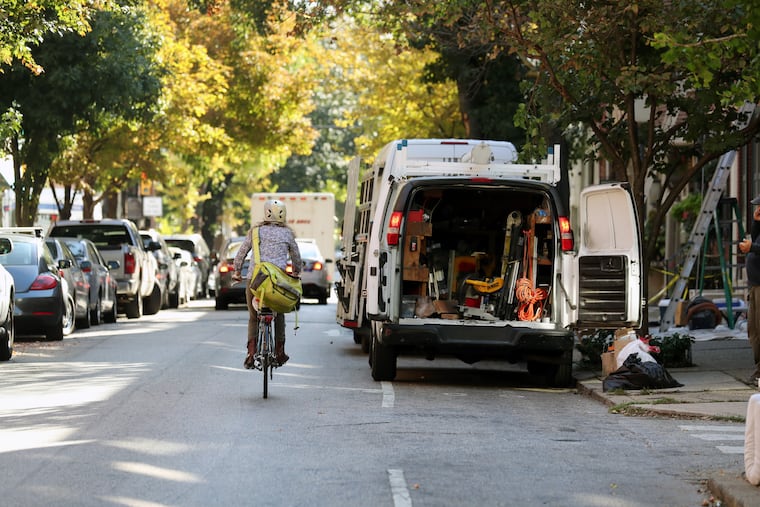Cycle-mounted officers will ticket vehicles that block bike lanes in Philly
Bicycle riders say parked vehicles impeding travel in designated bike lanes is a chronic problem.

The Philadelphia Parking Authority announced Wednesday that it is organizing a new enforcement squad to keep designated bicycle lanes clear in three of the most congested areas in the city by ticketing vehicles that illegally park in them.
Eight officers on bicycles will target bike lanes in University City, Center City, and South Philadelphia beginning this fall, said Corinne O’Connor, the deputy executive director of the parking authority.
“More and more people are commuting on bikes, and we’re here to support that,” O’Connor said in an interview. “The goal of the parking authority is to move transportation forward.”
It’s also about safety. Vehicle crashes killed 41 bicyclists on city streets from 2011 through 2021, according to PennDot and Philadelphia Police Department statistics. At least 135 were injured. When residents park in bike lanes in front of their homes or contractors leave their vans there during a job, riders often must swerve into traffic.
“I’m really excited about this program to hold motorists who abuse and encroach on bike lanes accountable,” said Sarah Clark Stuart, executive director of the Bicycle Coalition of Greater Philadelphia, who attended the news conference announcing the initiative.
» READ MORE: Philadelphians want protected bike lanes and pedestrian safety on Spring Garden Street
The Bicycle Coalition and the PPA have been talking about how best to address the challenge of bike-lane violations since 2014. Stuart said the authority had noticeably increased its enforcement efforts but described the mounted patrols as potentially a significant upgrade.
“Finally, this came together,” she said.
Tickets for parking or standing in Center City bike lanes carry a $76 penalty; in other areas of the city, the fine is $51.
She said bike-lane incursions are chronic on Spruce and Pine Streets, which are heavily traveled river-to-river routes for cyclists across the heart of the city.
At the time those bicycle lanes were established in 2009, then-Mayor Michael Nutter’s administration adopted an informal policy that residents could park temporarily while loading or unloading a vehicle. But some overstay the 20-minute limit.
Over the last decade, a political and cultural war has heated up over bike lanes, which some see as barometers of a rapidly changing city and gentrification. But city officials say that embracing multiple modes of transportation is the best way to fight traffic congestion. And the city’s Vision Zero policy envisions “complete streets,” on which motorists, cyclists, and pedestrians share the road.
“For me parking with impunity is deeply ingrained in Philadelphia,” Stuart said. “I hope this program will begin to whittle away a little at that.”
» READ MORE: What you need to know about bike lanes in Philadelphia (from 2017)
Since 2014, 25,700 citations have been issued for vehicles parking or standing, PPA officials say. That is by all enforcement agencies, including the parking authority, SEPTA police, Temple Police, and Penn Police.
For 2019, the number of bike-lane citations issued by all agencies was 4,176. During the pandemic in 2021, when fewer people were commuting by bicycle, 1,151 citations were issued.
Overall enforcement is increasing over time, PPA officials and bicycle advocates say, with some fluctuations caused by the pandemic. O’Connor said the number of citations shows the scope of the problem; she believes more enforcement will help.
The city has around 20 miles of protected bike lanes, including parking-separated lanes on Market Street, JFK Boulevard, Race Street, and the Chestnut Street Bridge. Those are state routes, and the lanes are allowed as a pilot program authorized by the legislature.